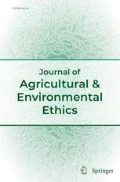Abstract
Ben Mepham has proposed that a ``matrix'' beused in the analysis of ethical problems in foodproduction and elsewhere. In particular cases, thismatrix would ideally cross the most important moralprinciples involved, and the individuals and groupsaffected by the decisions. In the following, Mepham'smodel is assessed in the case of geneticallyengineered bovine growth hormone. My argument is thata more straightforwardly ``consequentialist'' analysiscan draw attention to the problems of using thehormone better than Mepham's original proposal. It ispossible, however, that some nuances will be lost inthe process. I do not, therefore, argue for theoverall superiority of my suggestion – it is merelya slightly different, and perhaps sometimes a morepromising, way to analyze the ethical dimensions offood production and marketing.
Similar content being viewed by others
REFERENCES
Beauchamp, T. L. and J. F. Childress, Principles of Biomedical Ethics, 4th ed. (New York and Oxford: Oxford University Press, 1994).
European Commission Group of Advisers on the Ethical Aspects of Biotechnology, The Ethical Implications of the Use of Performance-enhancers in Agriculture and Fisheries (Rapporteurs M. Warnock and M. Sinisalo), 1993.
Häyry, M., “Ethics committees, principles and consequences,” Journal of Medical Ethics 24 (1998), 81-85.
Mepham, T. B., “Ethical analysis of food biotechnologies: an evaluative framework,” in B. Mepham (ed.), Food Ethics (London and New York: Routledge, 1996), pp. 101-119.
Mepham, T. B., P. N. Schofield, W. Zumkeller, and A. M. Cotterill, “Safety of milk from cows treated with bovine somatotrophin,” Lancet 344 (1995), 1445-1446.
Nottingham, S., Eat Your Genes: How genetically modified food is entering our diet (London and New York: Zed Books Ltd., 1998).
Xian, C. J., C. A. Shoubridge, and L. C. Read, “Degradation of insulin-like growth factor-1 in the adult rat gastrointestinal tract is limited by a specific antiserum of the dietary protein casein,” Journal of Endodocrinology 146 (1995), 215-225.
Author information
Authors and Affiliations
Rights and permissions
About this article
Cite this article
Häyry, M. How to Apply Ethical Principles to the Biotechnological Production of Food – The Case of Bovine Growth Hormone. Journal of Agricultural and Environmental Ethics 12, 177–184 (2000). https://doi.org/10.1023/A:1009594800384
Issue Date:
DOI: https://doi.org/10.1023/A:1009594800384



